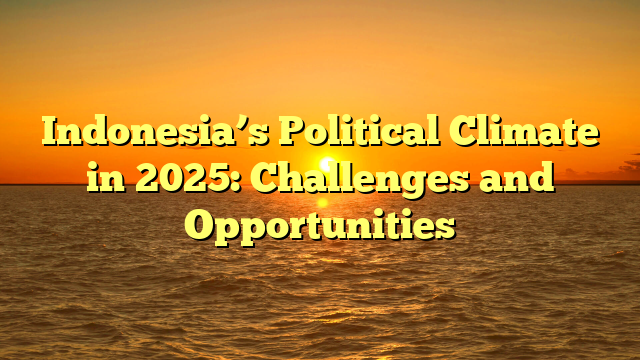Indonesia, Southeast Asia’s largest democracy, is experiencing a period of political transition and recalibration in 2025. Following the 2024 general elections, the nation finds itself under new leadership while grappling with old challenges such as inequality, corruption, and the strength of democratic institutions. This moment marks both a continuation of established policies and the introduction maritim4d of new priorities that could shape the nation’s political trajectory for years to come.
The change in administration has inevitably brought shifts in governance style, though many core policies from former President Joko Widodo’s era remain intact. Infrastructure development and industrial modernization, hallmarks of Jokowi’s presidency, continue to play a central role. The new leadership emphasizes sustaining economic growth while paying closer attention to inclusivity, particularly in regions that have long felt marginalized compared to Java and other urban centers. This reflects a recognition that national unity depends on narrowing the socio-economic gaps across Indonesia’s vast archipelago.
Coalition politics remain a defining feature of Indonesia’s government. With numerous parties competing for influence, coalition-building is essential for forming a stable administration. While such arrangements allow for representation of diverse voices, they also tend to produce compromises that can slow down urgent reforms. Observers warn that political bargaining often prioritizes power distribution among elites over long-term policy solutions, raising concerns about the effectiveness of governance.
Democracy in Indonesia, though vibrant compared to many neighbors, faces its share of vulnerabilities. Civil society groups and political analysts have noted growing polarization fueled by identity-based politics and misinformation, especially through social media platforms. Safeguarding democratic resilience requires strengthening institutions such as the judiciary, the press, and oversight bodies. The erosion of these institutions could risk undermining the democratic gains Indonesia has made since the Reformasi period in the late 1990s.
Corruption continues to be a persistent challenge that erodes public trust. The weakening of the Corruption Eradication Commission (KPK) in recent years has raised alarms among citizens who view the institution as a vital guardian of accountability. Calls for reforming the KPK and ensuring greater transparency in political financing are once again at the forefront of public discourse. Without decisive action, corruption may continue to slow economic progress and diminish confidence in government leadership.
On the international stage, Indonesia remains an influential voice in regional and global affairs. Its foreign policy continues to emphasize neutrality, multilateralism, and stability. As an active member of ASEAN and the G20, Indonesia seeks to balance relations with major powers like China and the United States, while also promoting regional cooperation in addressing climate change, trade, and security issues. Its role as a bridge between developed and developing nations remains a source of diplomatic strength.
Looking forward, Indonesia’s political path will be defined by its ability to balance continuity with change. The new government must reassure citizens that reforms will not be sacrificed for political expediency, while also addressing pressing social and economic issues. Public expectations are high: people demand not only sustained growth but also stronger democratic governance and fairer distribution of national wealth.
As the country enters this new chapter, Indonesia faces both challenges and opportunities. If its leaders succeed in maintaining stability, curbing corruption, and safeguarding democracy, the nation has the potential to emerge as a model for democratic resilience in the region. The coming years will determine whether Indonesia can fulfill this promise and solidify its role as a cornerstone of democracy in Southeast Asia.
